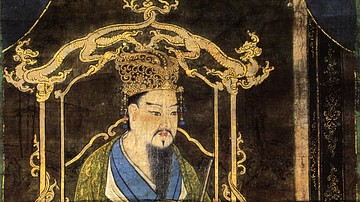Search
Search Results

Article
A Traditional Japanese House
The traditional house of ancient and medieval Japan (1185-1606 CE) is one of the most distinctive contributions that country has made to world architecture. While the rich and powerful might have lived in castles and villas, and the poor...

Definition
Portuguese Nagasaki
Nagasaki, on the northwest coast of Japan’s Kyushu Island, was an important Portuguese trading base from c. 1571 to 1639, and the most eastern outpost of the Portuguese empire. The Portuguese presence transformed Nagasaki from a small fishing...

Definition
Emperor Kammu
Emperor Kammu (aka Kanmu) reigned in ancient Japan from 781 to 806 CE and is most noted for relocating the capital to Heiankyo (Kyoto) in 794 CE. Kammu was one of the most powerful emperors Japan had seen or would ever see, and his reign...

Definition
Emperor Gaozu of Tang
Emperor Gaozu (also Kao-tsu, formerly Li Yuan, r. 618-626 CE) was a Sui military commander who led a rebellion against his former masters, seized control of the state, and founded the Tang Dynasty (618-906 CE). Overshadowed in the ancient...

Definition
Samurai Sword
Swords used by Japanese samurai were renowned for the craftsmanship which produced strong yet flexible curved steel blades with a single, super-sharp cutting edge. Produced from the 8th century CE onwards and symbolic of the samurai's elevated...

Article
Ancient Japanese & Chinese Relations
Relations between ancient Japan and China have a long history, and in certain periods the exchange of political, religious and cultural practices between the two was intense. China, the much older state and the more developed, passed on to...

Article
Life in a Japanese Buddhist Monastery
Buddhist monasteries have been part of the Japanese cultural landscape ever since the 7th century CE, and they remained both powerful and socially important institutions right through the medieval period. Today, many of Japan's finest examples...

Definition
Jade Emperor
The Supreme August Jade Emperor is the supreme deity of Chinese tradition and is otherwise known as Yuhuang Shangdi (Yu-huang Shang-ti), Yudi (Yu Ti) or Mr. Heaven (Lao-t'ien ye). He governs the cosmos and resides in a magnificent palace...

Definition
Kojiki - Japan's Oldest Book
The Kojiki ('Record of Ancient Things') is the oldest book of Japanese history and the oldest text of any kind from Japan. Compiled in 712 CE by the court scholar Ono Yasumaro, the work begins with the gods and the creation of the world...

Definition
Titus (Roman Emperor)
Titus was Roman emperor from 79 to 81 CE. On June 24, 79 CE Titus Flavius Vespasianus succeeded his father Vespasian (r. 69-79 CE) as emperor of the Roman Empire. Prior to his ascension to the throne, he was considered by many as “…unpopular...